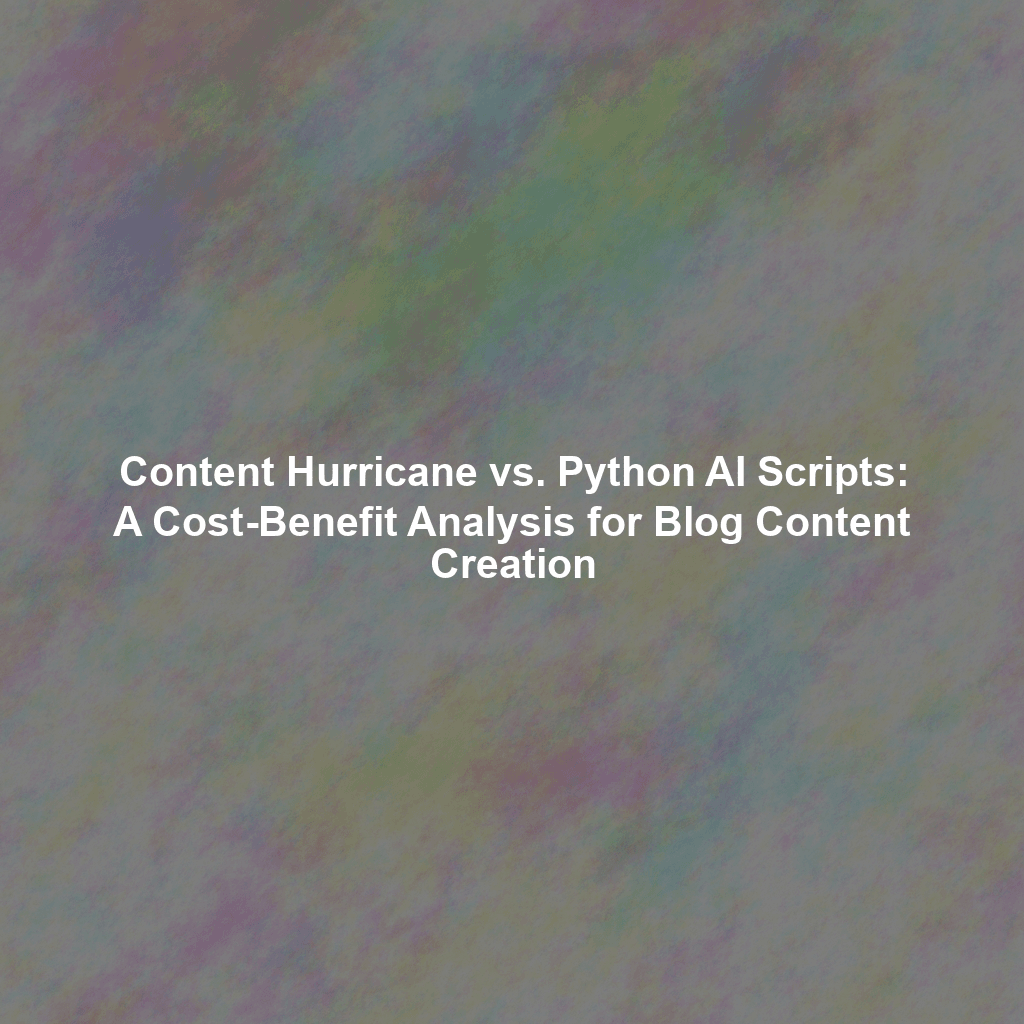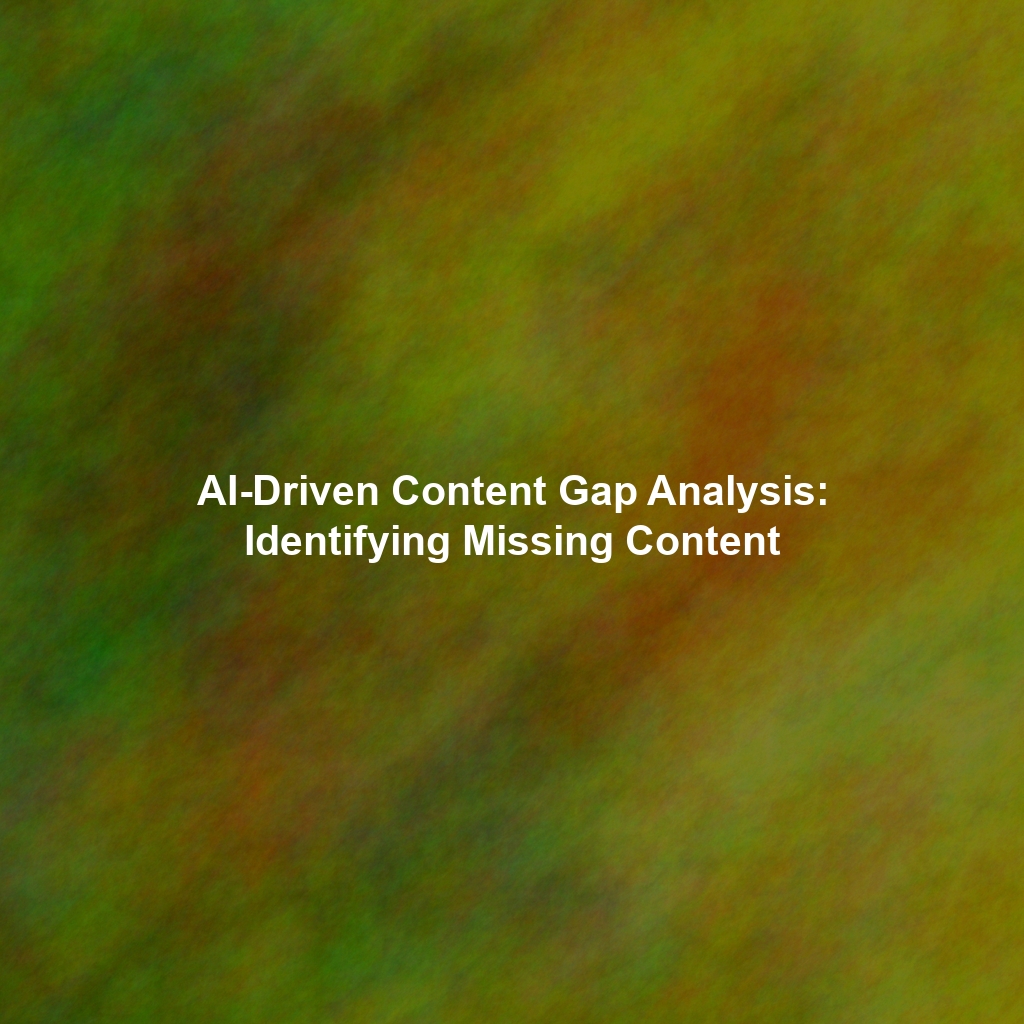In the ever-evolving landscape of content creation, businesses are constantly seeking efficient and cost-effective solutions. Artificial intelligence (AI) has emerged as a powerful tool, offering two primary approaches: leveraging large-scale AI content generation tools (which we’ll refer to as “Content Hurricanes” for the sake of this article) and developing custom Python scripts tailored to specific needs. This article delves into a cost-benefit analysis of both strategies, providing practical insights to help you make informed decisions for your blog content creation.
Understanding the Landscape: Content Hurricanes vs. Custom Python Scripts
What is a Content Hurricane?
A “Content Hurricane,” as we’re defining it, encompasses large-scale AI content generation tools. These platforms typically offer a user-friendly interface, often with templates and pre-built workflows for various content types, including blog posts, articles, and social media updates. They are designed for speed and volume, allowing users to generate a significant amount of content quickly.
What are Custom Python AI Scripts?
On the other hand, custom Python AI scripts involve developing code using Python libraries like TensorFlow, PyTorch, or the OpenAI API to create AI-powered content generation solutions. This approach offers greater control and flexibility, enabling you to tailor the AI model to your specific requirements and data. This requires significantly more technical expertise.
Cost Analysis: Direct and Indirect Costs
Content Hurricane: Cost Breakdown
- Initial Investment: Subscription fees vary depending on the plan and features. Often, there are free trials or entry-level plans, followed by tiered pricing as your needs increase.
- Ongoing Maintenance: Minimal. The platform provider handles updates, maintenance, and infrastructure.
- Editing Overhead: Potentially high. While these tools generate content quickly, it often requires significant editing and fact-checking to ensure accuracy, clarity, and alignment with your brand voice. Expect to invest time in refining the output.
- Training Costs: Minimal. The tools are generally user-friendly with readily available documentation and support.
- Indirect Costs: Limited control over the AI model. Dependence on the platform provider. Potential for generic-sounding content.
Custom Python Scripts: Cost Breakdown
- Initial Investment: Significant. Requires hiring or training developers with expertise in Python, AI/ML, and natural language processing (NLP).
- Ongoing Maintenance: High. Ongoing development, debugging, and model retraining are necessary to maintain performance and accuracy.
- Editing Overhead: Can be lower than Content Hurricanes *if* the model is well-trained on high-quality data and tailored to your specific requirements. However, expect an initial learning curve and iterative refinement.
- Training Costs: High. Training AI models requires substantial computational resources and data. Ongoing costs for model retraining and improvement.
- Indirect Costs: Requires infrastructure (servers, cloud computing) to run the models. Complexity in managing and scaling the solution. Risks associated with data security and model biases.
Content Quality: Depth, Accuracy, and Originality
Content Hurricane: Quality Considerations
Content Hurricanes excel at generating high volumes of content quickly. However, the quality can be inconsistent. The content may lack depth, originality, and a nuanced understanding of your target audience. Fact-checking and heavy editing are often necessary to ensure accuracy and avoid plagiarism. The content is more likely to sound “generic” than a custom-trained model.
Custom Python Scripts: Quality Considerations
With custom Python scripts, you have the potential to achieve higher content quality by tailoring the AI model to your specific domain and data. This can lead to more accurate, original, and engaging content that resonates with your audience. However, achieving this level of quality requires significant investment in data collection, model training, and ongoing refinement. Poorly trained models will generate gibberish or, worse, confidently incorrect information.
Real-World Examples and Use Cases
Scenario 1: Small Business Starting a Blog
Recommendation: Content Hurricane. A small business with limited resources and a need to quickly populate a blog with basic content might find a Content Hurricane to be a more viable option. The lower initial investment and ease of use make it accessible. The focus should be on heavy editing and fact-checking to ensure quality and relevance.
Scenario 2: Enterprise Company with a Dedicated Marketing Team
Recommendation: Hybrid approach or Custom Python Scripts. An enterprise company with a dedicated marketing and development team might benefit from a custom Python script or a hybrid approach. They could use a Content Hurricane for initial drafts and then leverage custom scripts for deeper research, data analysis, and content optimization. Alternatively, investing in custom scripts allows them to create highly specialized content tailored to their specific niche and brand voice.
Scenario 3: Niche Blog Focused on Technical Accuracy
Recommendation: Custom Python Scripts (with expert oversight). For a niche blog requiring high levels of technical accuracy (e.g., a blog about quantum physics), a custom Python script trained on reputable sources and overseen by subject matter experts is crucial. While the initial investment is higher, the long-term benefits of accurate and authoritative content outweigh the cost.
When to Choose a Content Hurricane
- You need to generate large volumes of content quickly.
- You have limited technical expertise and budget.
- You are willing to invest time in editing and fact-checking.
- The content doesn’t require deep technical accuracy.
When to Choose Custom Python Scripts
- You need highly specialized and accurate content.
- You have a dedicated development team and budget.
- You require greater control over the AI model and its output.
- You are willing to invest in data collection, model training, and ongoing maintenance.
Conclusion
The choice between Content Hurricanes and custom Python scripts for AI blog writing depends on your specific needs, resources, and content quality requirements. Content Hurricanes offer a quick and affordable solution for generating high volumes of content, while custom Python scripts provide greater control and potential for higher quality, albeit at a higher cost. Carefully consider the cost-benefit analysis outlined in this article to make an informed decision that aligns with your content strategy and business goals. A hybrid approach, combining the strengths of both methods, may also be a viable option for many organizations. Remember that even with the best AI tools, human oversight and editing are essential to ensure accuracy, clarity, and relevance.
 Skip to content
Skip to content

